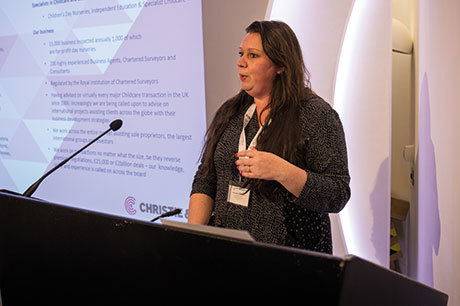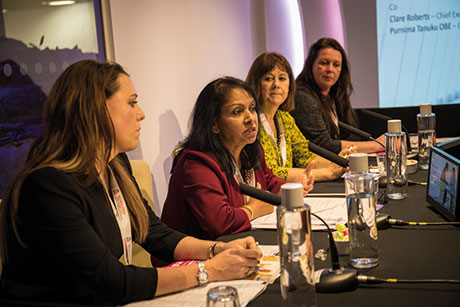

Download the PDF of this article
Owners of small settings are falling back on their savings to keep ‘the wolf from the door’, property expert Christie & Co said last week.
Speaking at the Nursery World Business Summit Big Debate, Christie & Co’s Courteney Donaldson said that over the past 18 months, the 30 hours policy and rising costs have led to an increase in closures, with more ‘fallout’ expected.
She said, ‘Increasingly we are meeting with owners who aren’t making a surplus. They have had their nursery for a long time. They have found the past 12 months very difficult, using their savings to keep themselves afloat. They do not want to close.
‘Ultimately, they are at the end of the road. We have no doubt that unfortunately we will see further fallout next year.’
She described a polarised sector with two key trends. At one end there was ‘the investor coming in keen to buy, grow and create infrastructure. Then you have Mrs Smith in Cornwall with a 40-place nursery who is really struggling to keep the wolf from the door’.
Ms Donaldson, who is managing director, childcare and education at Christie & Co, added ‘it is 30- to 40-place settings which are closing’, while there had been an ‘increase in planning permission for 100- to 200-place purpose-built nurseries built to a high spec’. These investors were looking to ‘future proof’ with high-quality buildings ‘and extra USPs because the market is very competitive’, she said.
Business performance had been hit by rising costs, and not only will there ‘be future closures as operators struggle to make ends meet’, but ‘there will be a diminution of quality as it is harder to invest’, Ms Donaldson added.
‘If you are 30 places, you are not going to be able to address the issues as well as if you are 100 places,’ she said. ‘Business rates revocation would make a real difference.’
BREXIT AND MARKET ACTIVITY
The weak pound means ‘we have buyers looking from across the world keen to find UK businesses’, said Ms Donaldson.
Overall, she said, investment activity had been ‘frenetic’. There have been ‘significant portfolio transactions and those portfolios have been achieving significant value premiums. It is really difficult to grow one nursery let alone a successful group of nurseries.’ Meanwhile, despite recent closures, a ‘shortage of supply is fuelling demand’, she said, adding that the UK nursery sector remains fragmented so ‘the opportunity to consolidate is really quite significant’.
Citing an example of the effects of Brexit, Ms Donaldson said one London nursery had been catering for French, Italian and Swiss parents, but ‘following the Brexit referendum all of these families were relocated by their employers, which meant the business ran into significant difficulties as occupancy crashed through the floor’.
Because of its location, in central London, the nursery had striven to turn the business around and was now catering for Chinese and Russian families, she added.
Also on the Big Debate panel was Purnima Tanuku, chief executive of the National Day Nurseries Association. She said, ‘We are seeing a huge number of closures since 30 hours, and that is increasing. Some of the providers have been in business for 30 years are struggling to make it work – that is the part that Government is not acknowledging.’
She contradicted children and families minister Nadhim Zahawi’s earlier citing of Ofsted data showing the number of childcare places had remained broadly constant since 2012 (despite decreasing numbers of providers), saying the number of places had actually decreased. She said, ‘My fear is now that Government thinks it has done 30 hours and moved on. We need to keep the pressure up.’
DISADVANTAGED
 Cary Rankin, managing director of Bertram Nurseries, said that for nurseries in deprived areas, ‘a lack of balance of private to funded [hours] meant that cross-subsidy was key to making those settings sustainable’.
Cary Rankin, managing director of Bertram Nurseries, said that for nurseries in deprived areas, ‘a lack of balance of private to funded [hours] meant that cross-subsidy was key to making those settings sustainable’.
He added, ‘We are seeing where we serve more of those funded areas that those nurseries are feeling a lot more of the pinch.
‘Obviously as a group you can cross-subsidise, but nurseries still need to pay for themselves. You want to be in those communities because you want to help these parents and children. But it is becoming a very difficult justification to make in some cases.
‘While the minister was very quick in saying some parents were very positive about the 30 hours, some of these key areas of deprivation don’t get access to [it].
‘We are a strong sector and we get up from the punches, but there does come a point when you have to look at the reality of running these operations – are they actually ticking the boxes for the parents that are most in need?’
Ms Tanuku replied, ‘I think this is what DfE is taking advantage of.’ She said that while the Government had promised ‘£20m here, £5m there’ through its social mobility strategy, the ‘fundamental issue we have got is that the pot of money is not big enough’.
Ms Donaldson added that these difficulties were exacerbated by the closure of Children’s Centres in many parts of the country, which meant supply of places was diminishing, while some of the PVIs serving some of the most deprived children were ‘really struggling’.
She said, ‘Children with extra needs need extra support and the funding just isn’t there to deliver the quality of care that is required.’
Panellist Clare Roberts, chief executive of Kids Planet Day Nurseries, a group of 32 settings, said ‘because of the size of our nurseries, that is how we are able to make our model work’.
One of its five Salford settings is delivering 65 per cent funded two-year-old provision. ‘We work that around our quieter days and because of the demographic it was surprising how many people wanted to come to nursery in the afternoon rather than the morning,’ Ms Roberts said.
She added it was important that settings ‘pushed back’ against local authorities assuming they would foot the bill for 1:1 SEND support, saying her local authorities thought Kids Planet would absorb the costs because it was a big group.
She said, ‘We were swallowing costs to the extent it was detrimental to us as a business because the local authority were just thinking, “Kids Planet will absorb it.” So we pushed right back and said, “You want us to help all these families of course, and we want to, but you have to put your money where your mouth is – we can only cover the costs for so long.” And actually we have got a lot better result by doing that. I was telling managers they had to be harder because I think we were getting to a point where parents weren’t getting what they were entitled to.’
She also said she had got business rate credits from about 70 per cent of her local authorities.
MAIN POINTS
- The UK nursery sector remains fragmented – 80 per cent single settings, 20 per cent groups
- 30- to 40-place settings are closing, and more are expected to close because of cost pressures
- 100- to 200-place settings, often purpose-built, are on the increase
- The weak pound is fuelling a surge in investment from abroad, especially for group
- Brexit may mean a change in parental demographic if companies relocate staff
![]() MORE INFORMATION
MORE INFORMATION
 The Big Debate, ‘UK nursery businesses: striving for success’, in association with Christie & Co, took place at Nursery World’s 5th annual Business Summit on 14 November (www.nurserybusiness-summit.com). For more information about Big Debates and other events, email tom.curtiss@markallengroup.com
The Big Debate, ‘UK nursery businesses: striving for success’, in association with Christie & Co, took place at Nursery World’s 5th annual Business Summit on 14 November (www.nurserybusiness-summit.com). For more information about Big Debates and other events, email tom.curtiss@markallengroup.com
